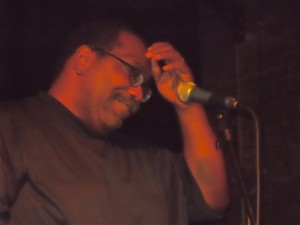Introduction for Fred Moten @ SEGUE
BY Thom Donovan
 Two great readings at SEGUE series yesterday, the first by Mónica de la Torre who, with the help of Rob Fitterman (on bullhorn), read/performed a wonderful text evoking a host of bureaucratic/procedural realities after Martin Kippenberger's The Happy Ending of Franz Kafka's "Amerika". Thinking about how to teach Moten's work later this semester in relation to notions of "commons" and "political economy of sound" in lyric poetry, I wrote the following by way of introduction:
Two great readings at SEGUE series yesterday, the first by Mónica de la Torre who, with the help of Rob Fitterman (on bullhorn), read/performed a wonderful text evoking a host of bureaucratic/procedural realities after Martin Kippenberger's The Happy Ending of Franz Kafka's "Amerika". Thinking about how to teach Moten's work later this semester in relation to notions of "commons" and "political economy of sound" in lyric poetry, I wrote the following by way of introduction:
How to build a commons—a space that is for all and not just a few? How to build a commons out of the wreckages of modernity (most of all the North Atlantic Slave Trade) and the atrocious and quashed manifestations of communism in the 20th century? How, in terms of African-American diaspora, to admit common property when the bodies of Black folks were once the possession (and, in countless ways, still are the possession) of others? How do art and poetry presence this aporia? How can a commons be built out of this aporia? To what extent is commons a matter of unbuilding—dismantling administered worlds?
Sound—what Moten calls “phonic substance”—is key to a post-antebellum usufruct: the right to use and enjoy a property shared in common by all. Throughout the poems of Moten’s Hughson’s Tavern, poetry’s sonic values both drive what Nathaniel Mackey calls a “discrepant engagement”—a refusal of the terms of collaboration with hegemonic lyrical discourse—while searching for sounds that Moten holds in common with a readership, that make, as it were, common sense—if only by completely overturning it. In Moten’s lyric, I hear the freshness of the rap song that comprises the lyrical condensation of radical Black discourse since the 70s—the language edge of the language edge. Likewise, I hear the cut of horn players blowing, making caesuras on a plane of immanence, shoring-up intensities born out of encounter, conflict, and genocide. So sonic intensity is tantamount to submerged embodied historiography.
The sound values of poetry in Hughson’s Tavern channel the failed slave revolts of 1741 New York City, revolts which set fire to the city, and drew-out the racism of white elites, and drew-upon the class antagonism of poor whites. What would it mean to return to that moment?—Moten’s Hughson’s Tavern seems to ask. As though we could time-travel through the sonic. As though the sonic were the future anterior of Black dispossession/reparation—what allows 'us' to feel or sense what we would have wanted to have happened? What if the slaves and poor whites had bound together successfully and taken over the city—a contingency? What does it mean with each revolutionary struggle to remember those who died in struggling. Commons, as Moten insists in his poem as well, is built upon loss, lack, losing and being lost. Where one cannot return, but only overturn, space fills-up—a kind of grave in the air of auritures legislating unknown worlds.
“whiteness ain’t the same as them / a grave in exchange for the commons. / blackness is a range of deviations from in the commons. […] motherfuckers gave up the commons / for a grave. you gave up the commons for a grave but / black migrates for who it is…” —from “five points, ten points”
“to level that commons, that commotion, improper kant, jargon of / the transcendent, derange how crazy plain is, out like a plain / black coat fled till sequins.” —from “the proper chant”
“The burning hole is hard to get a hold of whole so / this is for the ones who illuminate black suffering.” —from “We live after a river.”
“mama organized / a break in your loss and art.” […] to read everything to caress / the sinful communism.” […] “everybody who ever / came into the broke inside.”
—from “pelican bay”
Reading Moten’s new book in manuscript form, B Jenkins, I am struck by Moten’s titling, in which he names “his main men” (which also include many women). Compulsively dedicating poem after poem myself, Moten’s naming is not just dedicatory—rather it makes proper naming an index of intensity. The name, in Moten’s poetry, becomes common property. It outlines an immaterial area, the area of personages who are never just one, but many in their relation to each other and us. Through the sonic qualities of the poem, the poem sings these names, inscribing through them the struggle to be, addressing the company which the poet keeps. The commons is about keeping company because we are not just one name, but many; and the people those names belong to become porous to 'us.' It is their sound shapes 'we' are channeling—that make a possible commons up.
Thom Donovan lives in New York City where he edits Wild Horses of Fire weblog (whof.blogspot.com) and...
Read Full Biography

